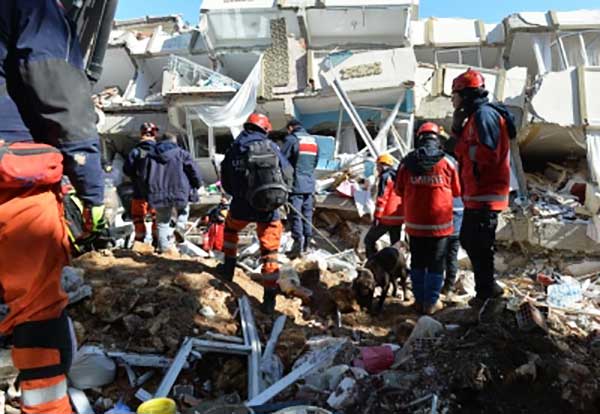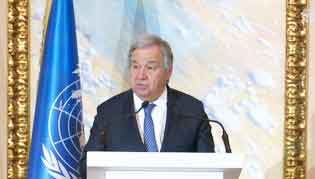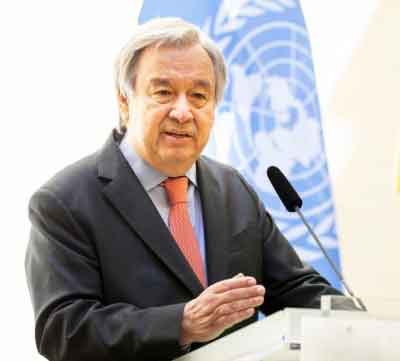As search and rescue efforts continued for a sixth straight day on Saturday to find more survivors, the number of people killed following the devastating earthquakes that struck Turkey and Syria on February 6 has reached at least 23,831, according to authorities.
In its latest update, Turkey's Disaster and Emergency Management Authority (AFAD) said the overall death toll currently stood at 20,318, with 80,052 reported injuries, Anadolu News Agency reported.
The 7.7- and 7.6-magnitude earthquakes, centred in the Kahramanmaras province, affected more than 13 million people across the provinces of Adana, Adiyaman, Diyarbakir, Gaziantep, Hatay, Kilis, Malatya, Osmaniye and Sanliurfa.
In Syria, the total number of those killed stands at 3,513, CNN reported.
According to volunteer organisation Syria Civil Defense, also known as the White Helmets, 2,166 deaths were registered in rebel-held areas in the northwest of the country.
Meanwhile, the Syrian state media has said that 1,347 fatalities were reported in government-controlled parts of the war-torn nation.
The delivery of urgent supplies to quake-hit rebel-held areas in northern and northwestern Syria has been complicated by a long-running civil war between opposition groups and the Syrian government.
On Friday, Turkish President Recep Tayyip Erdogan acknowledged that his government's response to the massive disaster was not as fast as desired, reports Xinhua news agency.
"Too many buildings were damaged, unfortunately. We were not able to speed up our interventions as quickly as we had desired," he told reporters in the quake-affected Adiyaman province.
The emergency work was "very difficult" as the devastating effect of the earthquake spread over an area of 500 km, he said, adding that the harsh winter has been another obstacle.
"Most of the public workers, who would have conducted the first intervention and organizations, were themselves under the collapsed buildings," the President added.
Erdogan had earlier admitted that the government had shortcomings in responding to disaster on the first day, but then had better managed the situation.
But now the country has gathered "perhaps the world's largest search and rescue teams" with more than 141,000 staff, including foreign emergency teams, he said.
The President has pledged to rebuild the quake-hit region within one year and provide one-year rental assistance for victims of the earthquake if they do not want to live in tents.
Erdogan's government has faced criticism from the quake victims that the emergency response was late and humanitarian aid was not sufficient in the earthquake zone of 10 provinces, which are home to nearly 13.5 million people.
The Turkish parliament on Thursday passed a state of emergency decision in 10 provinces impacted by the earthquake for three months upon the request of the President.
Meanwhile, over 81,000 people have been evacuated from the quake hit regions, according to AFAD.
Rescuers, relatives and local citizens burst into tears of joy after an eight-year-old boy was saved from the ruins of a building at Antakya, a district of Hatay province, 108 hours after the quake.
In the town of Iskenderun, a family of six was extracted from the rubble after 102 hours.
Raziye and Haci Murat Kilinc, two neighbours of the family, were rescued after 107 hours.
Many countries and global aid agencies have voiced support for the two countries, and some of them have sent rescue teams and relief supplies to quake-hit regions.
The devastating 7.8 tremor struck Turkey's southern province of Kahramanmaras at 4.17 a.m. on February 6, which was followed by a 6.4-magnitude temblor a few minutes later in Gaziantep province.
The epicentre of the 7.8-magnitude quake was 23 km east of Nurdagi in Gaziantep, at a depth of 24.1 km.
At around 1.30 p.m, a third 7.5-magnitude tremor hit Kahramanmaras.






EAM Jaishankar flags Pakistan's escalation in calls with counterparts from US, Italy
External Affairs Minister (EAM) S. Jaishankar spoke with counterparts from several countries, including the US, late Thursday night, asserting India's strong resolve to firmly counter any attempts at escalation being made by Pakistan.
Pakistan's aerial attacks foiled by Indian air defences amid blackouts and sirens, no damage, say forces; retaliatory measures launched
Aerial attacks by Pakistan targeting Jammu as well as several military stations near the western border were successfully foiled by India’s air defence systems on Thursday night, with the armed forces saying no damage had been caused.
Security beefed up in Assam along B'desh border amid India-Pak tensions
Amid tensions between India and Pakistan, the Assam government has ramped up the security vigilance along the International Border with Bangladesh, officials said on Thursday.
8 pistols, 16 empty magazines found on train arriving in Agartala from Punjab
The Government Railway Police (GRP) and Railway Protection Force (RPF), in a joint operation on Thursday, recovered eight pistols and 16 empty magazines from an express train after it reached Agartala railway station from Punjab, officials said.
ISRO Chairman to grace 5th Convocation of Central Agricultural University on May 11
The Central Agricultural University (CAU) is set to hold its fifth convocation ceremony on May 11, 2025, at the campus hall of the College of Fisheries in Lembuchhara. This was announced today by Professor A.B. Patil, Dean of the Fishery College, during a press conference held on campus.
National Lok Adalat in Tripura on May 10; Over 21,000 cases to be taken up
The second National Lok Adalat of the year is set to be held across Tripura on Saturday, May 10. The initiative will be conducted not only at the Tripura High Court but also in all district and sub-divisional court complexes across the state.
CRRI to probe cracks on newly built NH-208 stretch in Tripura
The National Highways and Infrastructure Development Corporation Limited (NHIDCL) has sought the expertise of the Central Road Research Institute (CRRI) after significant cracks and pavement damage emerged along a newly-constructed stretch of National Highway 208 in Tripura.